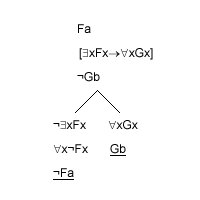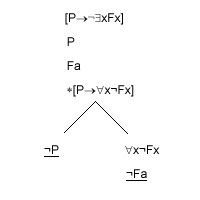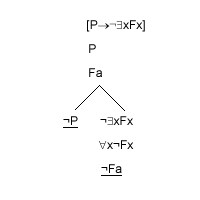| ||||||||||||||||||||||||||||||
The ¬"xj rule
The rule is:
 |
The rationale for this rule is that "$x¬j" is equivalent to "¬"xj".
Note that the rule applies only to formulae which begin with "¬"".
The ¬$xj rule
The rule is:
 |
The rationale for this rule is that ""x¬j" is equivalent to "¬$xj".
Note that the rule applies only to formulae which begin with "¬$".
Example: a proof that the following argument is valid:
|
Fa [$xFx®"xGx] So, Gb |
The counterexample set is {Fa, [$xFx®"xGx], ¬Gb}
|
|
The tableau closes; so the counterexample set is inconsistent; so the argument is valid.
The following is an incorrect attempt to apply the rule:
|
|
The mistake consists in the application of the rule to a formula which does not begin with "¬$x".
The following is correct:
|
|
| Print this page |


